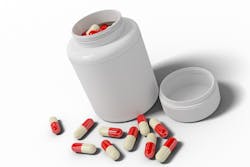Studies highlight impact of COVID-19 on antibiotic use
Since the novel coronavirus pandemic began, limited data from small studies in several countries have indicated high rates of antibiotic prescribing in COVID-19 patients and low rates of bacterial co-infections, raising concerns about unnecessary antibiotic use and the pandemic's potential impact on antimicrobial resistance (AMR), according to a news report from the Center for Infectious Disease Research and Policy (CIDRAP) at the University of Minnesota.
In a new study published in Clinical Infectious Disease, researchers in Michigan looked at data on more than 1,700 hospitalized COVID-19 patients treated at 38 Michigan hospitals from March 13 to June 18 and found that more than half received early antibiotic therapy, with antibiotic use as high as 84 percent in some hospitals. But only a small fraction of those patients had bacterial co-infections.
But in another study COVID-19's impact on antibiotic use, researchers in Pittsburgh reported that monthly antibiotic use in the Veterans Affairs (VA) Pittsburgh Healthcare System was down significantly in March through June compared with previous years, as a result of COVID-19 restrictions that limited medical procedures at the hospitals.
Taken together, these findings suggest that COVID-19 has affected antibiotic use in different ways, creating a cloudy picture of how the pandemic will ultimately affect AMR. Researchers agree that excessive antibiotic use during the pandemic will likely increase AMR in some regions of the world, particularly in hard-hit areas that already have a high prevalence of drug-resistant pathogens.

